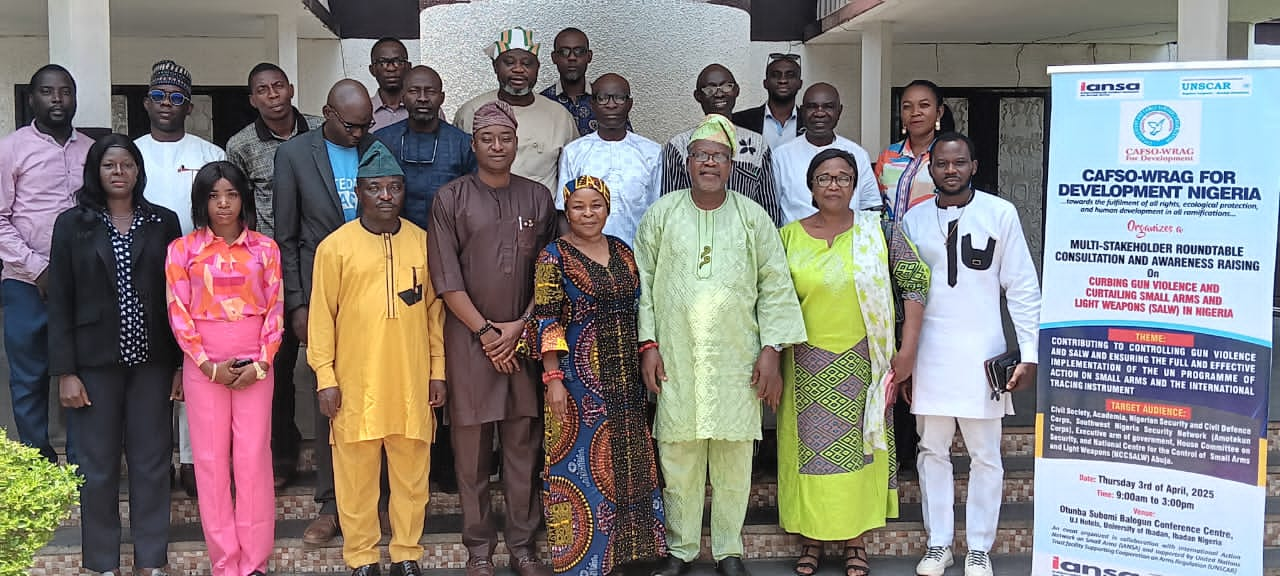By Bilesanmi Abayomi
Security experts and stakeholders have called for urgent and comprehensive measures to tackle gun violence and curb the proliferation of Small Arms and Light Weapons (SALW) in Nigeria. The appeal was made at a one-day roundtable consultation organized by CAFSO-WRAG for Development, in collaboration with the International Action Network on Small Arms (IANSA), at the Otunba Subomi Balogun Conference Centre, University of Ibadan.
Dr. Tola Winjobi, Principal Coordinator of CAFSO-WRAG for Development, in his welcome address, emphasized the urgent need to curb the illegal circulation of arms, which has fueled violent conflicts, terrorism, and insecurity across the country.

“Nigeria has been plagued by sectarian conflicts, kidnappings, armed robberies, and terrorist attacks, all worsened by the easy availability of illicit firearms,” Dr. Winjobi stated. “From insurgencies in the North to clashes between herders and farmers, small arms have become tools of destruction.”
The event brought together key representatives from the National Centre for the Control of SALW, the Oyo State government, the House Committee on Security, the Nigeria Police, the Nigerian Security and Civil Defence Corps (NSCDC), Amotekun Corps, and civil society organizations. Discussions focused on strengthening policy implementation and security strategies to tackle arms trafficking.

Dr Winjobi reiterated CAFSO-WRAG’s commitment to supporting the full implementation of the UN Programme of Action on Small Arms (PoA) and the International Tracing Instrument (ITI). He called for stricter gun laws, improved border security, and enhanced intelligence-sharing among security agencies.

The discussion also addressed the impact of gun violence by both state and non-state actors. Dr Winjobi condemned police brutality and accidental discharges, revealing that between 2020 and 2022, security forces were responsible for the deaths of at least 148 civilians, with Amnesty International reporting 115 killings in southeastern Nigeria within three months in 2021.
To combat arms smuggling, he urged the federal government to strengthen border surveillance, deploy advanced technology such as drones and scanners, and improve inter-agency collaboration. He also called for stricter vetting processes to ensure that individuals with psychological instability are denied firearm licenses.
Beyond security measures, Dr Winjobi highlighted the socio-economic drivers of gun violence, linking rising crime rates to poverty and unemployment. He criticized the high cost of governance and urged President Bola Tinubu to adopt policies that prioritize human rights and social welfare.
“Many young Nigerians turn to crime out of economic desperation. If the government truly acknowledges their suffering, it must cut excessive governance expenses and redirect funds to public welfare,” he said.
The roundtable concluded with a call for greater community engagement in security efforts. Participants recommended the establishment of neighbourhood watch programs, improved police-community relations, and increased surveillance of suspicious activities.
Dr. Winjobi further urged the federal government to commit to implementing the seven advocacy points from the Fourth Review Conference on the UN Programme of Action (RevCon4) held in June 2024. These include strengthening arms transfer controls, regulating SALW ammunition, and ensuring responsible civilian firearm ownership.
The event ended with a renewed commitment from stakeholders to intensify advocacy, policy enforcement, and collective action to curb Nigeria’s gun violence crisis.

